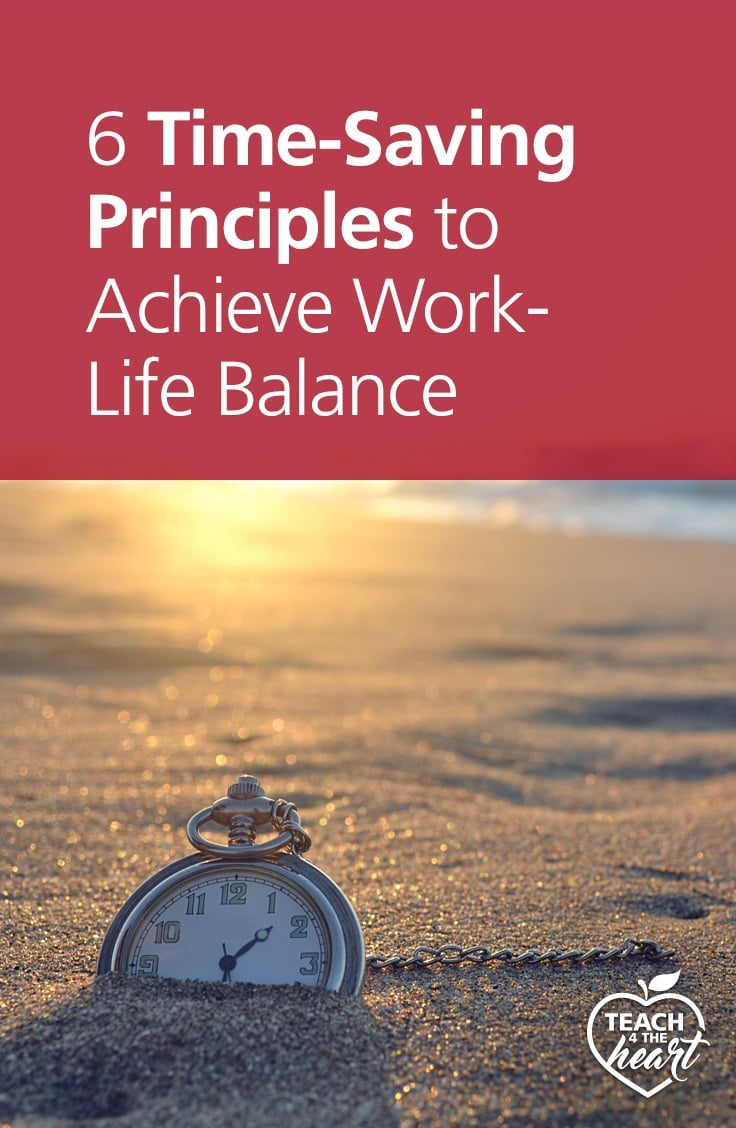There’s no doubt that teaching can be stressful & overwhelming at times. But that certainly doesn’t mean it should be taking over your life.
Many teachers are reporting that COVID-19 required even more work of them than before. They suddenly had to learn all about distance learning practices, create video lessons, be available virtually to students, and communicate more often with parents- on top of regular teaching tasks. The upcoming school year is still a question mark and many teachers are planning for both distance and in-person learning. Now is the time to refine your work-life balance so you are ready for next year. You CAN be an effective teacher and still have a life outside of school.
But it certainly won’t happen by accident. To create the balance you so desperately need, you’ve got to make some changes. And these 6 time-saving principles are the key to keeping your life sustainable.
These principles come from Angela Watson, creator of 40 Hour Teacher Workweek Club, an amazing club that’s changing hundreds of teachers lives. These over-arching principles form the foundation of the club & can be applied to all areas of teaching – and life.
Save Time, GET MORE DONE, and Finally Find Work-Life Balance
- Eliminate unintentional breaks. Notice the goal is not to eliminate all breaks. The point is to work when we plan to work and break when we plan to break. During work times, we can’t allow ourselves to be distracted by social media, our phones, our own procrastination, or anything else.
- Figure out the main thing & do it first. This concept has transformed my productivity, and I know it can do wonders for yours, too. Each day, think about what one important task most needs to be done that day. Then during the first block of time you get, do that main thing first. Don’t check your email or throw some grades in the computer first. Instead, get the main thing done first then worry about everything else. You’ll feel great knowing that even if the rest of the day gets derailed, at least you got your most important task done.
- Work ahead by batching & avoid multi-tasking unless the work is mindless. Batching means doing the same task all together instead of doing the same thing over and over. For example, if you make all your copies for the whole week at once, that saves time over running to the copier 5 times a day. It takes intentional planning to work ahead by batching, but it feels so good once it’s done.
Now when it comes to multi-tasking, I am a chronic multi-tasker. But I’m learning that multi-tasking only helps when the work is truly mindless (think checking multiple choice answers or making copies). Otherwise, multi-tasking actually breaks your focus & makes you less efficient. - Look for innovative ways to relax any standards that create unnecessary work. Sometimes we as teachers have these standards for ourselves that we simply made up. We’ve decided in our minds that this is the way it has to be done, even though it’s taking up a ton of time. But the reality is that we don’t have to do it that way. There’s probably another way to do it that will work just as well in a whole less time.
For example, when grading writing, we might have a standard that dictates we write copious notes & feedback on students' papers. But, actually, that's an unnecessary standard, and the goal of providing good feedback could be accomplished in way less time. I explain the solution I found for grading writing quickly here. - Use scheduling to create boundaries around your time. If you don’t decide ahead of time when you’re going to work & when you’re not, work will always spill over into your family life. But if you instead plan when you’re going to work & schedule that time, you create boundaries around your time and you’re able to actually walk away.
Angela Watson has offered Teach 4 the Heart readers an awesome resource to help you decide how many hours you need to work to get done what you need to, schedule that time, and then stick to it. Click here to get your free guide “How to Choose a Target Number of Work Hours & Stick to It”. - Small changes add up to big results. You don't have to spend hours and hours making huge changes in order to see results. Little tweaks and mindset shifts, stacked on top of each other, add up over time and make a profound difference. The key is to get started and to continually improve, little by little, over time.
If this all sounds great but you're still unsure exactly how to do all this, then I highly recommend Angela Watson's 40 Hour Teacher Workweek Club. It's been recently updated and reformatted for the unique needs of teachers dealing with COVID-19.
This incredible program is helping thousands of teachers just like you not only cut 3, 5, even 10 or more hours off their workweek but actually break that 24/7 stress cycle and finally enjoy teaching again.
The 40 Hour Teacher Workweek will teach you how to live a better, healthier life as a teacher – how to get everything done and still have room for yourself and your family. And, best of all, you’ll find yourself become a better, more organized, and more efficient teacher in the process.
I cannot recommend this program highly enough. Click here to find out more about the 40 Hour Teacher Workweek Club.

Links:
- Free Guide “How to Choose a Target Number of Work Hours & Stick to It”
- The 40 Hour Teacher Workweek Club
- 5 Time-Saving Practices to Stop Feeling Overwhelmed
Help out a fellow teacher by sharing this post on Pinterest or Facebook.

*Disclaimer: I partner with Angela Watson to help spread the word about this program because we've seen it help thousands of teachers regain work-life balance, and we want you to experience that, too. If you enroll in the club after clicking the button above, Teach 4 the Heart will receive a commission at no extra cost to you. Thanks for helping support Teach 4 the Heart in this way.


These are so simple, and yet so true. I’m printing these and the Eight Lies Teachers Tell Themselves to keep track of these God-honoring truths.
Thanks for sharing this valuable information. It’ll be very helpful for me.
It sounds fascinating. I don’t think I’ve ever worked just 40 hours a week. I feel like my life is work. But I love it. And even if I feel tired, I know I’m doing the right and necessary things. Although I need to master time management because I understand that my initiative will be gone sooner or later.
Thank you, it is interesting!